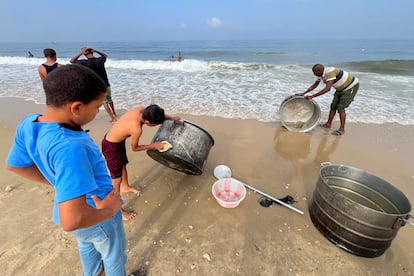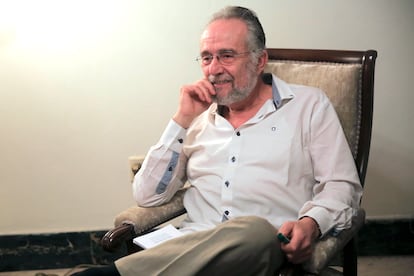Pedro Arrojo, UN Special Rapporteur: ‘The Gaza war is heading towards genocide’
The Spanish expert warns, together with an independent panel, that a ceasefire in the Gaza Strip is essential to ‘avoid a serious risk of genocide’

There is no question that Gaza’s civilians are already living through a humanitarian catastrophe. A group of seven independent UN experts warned this week that a ceasefire by the Israeli army in the Gaza Strip is necessary to “avoid a serious risk of genocide”. The Spaniard Pedro Arrojo (Madrid, 72 years old), UN Special Rapporteur on the Human Rights to Safe Drinking Water and Sanitation — and member of the UN expert group —, explains: “Even if there is no clear intention, the data show that the war is heading towards genocide”. His position is based on article 7 of the Rome Statute, which understands extermination as “deprivation of access to food or medicine, among others”, such as water.
“Inevitably, diseases will skyrocket [in Gaza] and many will die because they do not have access to the most basic medicines,” Arrojo told EL PAÍS over the phone. This independent expert, also a professor at the University of Zaragoza, specifies that “there is no drinking water left” in the Strip and that hundreds of thousands are drinking salty and unhealthy water in order not to die of thirst.
“The situation has reached a catastrophic tipping point,” the group of seven UN rapporteurs said this week, holding not only Israel but also its international allies responsible for the protection of the 2.2 million Palestinians living in the enclave.

The convoys of humanitarian aid arriving in the Strip through the Egyptian Rafah crossing are “insufficient, to the point that they do not even cover 1% of the drinking water needed,” according to Arrojo. The UN had already warned that Gaza residents have been living on less than three liters of water a day since the start of the war on October 7, far below the 50 liters recommended by the World Health Organization for drinking and hygiene.
The seven rapporteurs also expressed concern for the safety of humanitarian workers and doctors, who are “protected by international law.” The communiqué, in which the experts quote UN Secretary-General António Guterres, reminds both the Israeli army and Hamas that “even war has rules.” Since the start of the Israeli counteroffensive, 9,227 people have died, including almost 4,000 children, according to the Gazan Ministry of Health.
Drinking unsafe water
Gaza has three main sources of water: aquifers, desalination plants and pipelines connecting to Israel. The aquifers, according to Arrojo, are being overdrawn, with more than three times as much water being extracted as is naturally replenished. This not only reduces freshwater levels, but also causes “massive infiltration” of saltwater, which comes mainly from the Mediterranean Sea.
The desalination plants are only partially operating as a result of power outages in the Strip. Of the three in the enclave, according to CNN, only one is operating at 7% of its usual capacity. Before the war, 90% of the supply came from this source. “Cutting off the power is cutting off the water,” says the expert.
The final source, the one supplied through three pipelines connected to Israel, through which 10% of the water consumed in Gaza enters, was cut off at the beginning of the war. The supply was only partially resumed (two of the three pipes) as of October 15.
In this scenario, Arrojo denounces that thousands of people are consuming salt water from agricultural wells, which they extract manually, “to be able to survive”, as long as they have enough fuel or energy to operate the pumps. The main problem is that the continuous intake of salty, unhealthy water can lead to illnesses such as diarrhea, which then translates into dehydration or kidney collapse. “Drinking this water makes you vomit, but if you stop, in five or six days you die,” he adds.
In addition to consumption, sanitation is also at its limit. The five sewage treatment plants in Gaza have been forced to close, which has caused wastewater to mix with the water in the aquifers and waste to accumulate in some streets, generating even more risk of diseases that can affect mainly children. “Statistics will be compiled on how many people die in air raids, but those who have become ill from drinking unsafe water will be left in the shadows,” he says.
Ceasefire
For the experts, it is essential that Israel decrees a ceasefire in order to facilitate the entry of humanitarian aid, while allowing an “opening of the channels of communication” to ensure the release of the hostages kidnapped by Hamas. U.S. Secretary of State Antony Blinken visited Israel on Friday, for the third time since the start of the conflict, to call for greater protection for civilians.
The White House advocates the implementation of “humanitarian pauses” with specific objectives, such as bringing humanitarian aid into the Strip and allowing the exit of foreigners and wounded to Egypt; but opposes a complete ceasefire. Israeli Prime Minister Benjamin Netanyahu has also ruled out this option: “We will not stop until victory,” he said. He has also argued that he will only consider this alternative once all the hostages, which he puts at 242, have been released.
The UN General Assembly last week approved a non-binding resolution calling for an “immediate, durable and sustained humanitarian truce”, an action that the panel received with “hope”, although it considers that action must be taken soon. For Arrojo, the votes against — among which are those of the U.S., Hungary, Czech Republic, Croatia or Austria — are “shameful and a disgrace.”
Arrojo believes that the key to avoiding a major escalation in the conflict lies with the US, along with Europe. “The great Western powers protect Israel and allow it to do what it wants”. The expert assures that more and more colleagues of his, and even UN high commissioners, are coalescing around the need to introduce humanitarian aid into Gaza. “Several discussions are opening up in Geneva. No one is contesting my arguments that a crime against humanity is being committed. The Statute [of Rome, which governs the International Criminal Court] is clear.”

Sign up for our weekly newsletter to get more English-language news coverage from EL PAÍS USA Edition
Tu suscripción se está usando en otro dispositivo
¿Quieres añadir otro usuario a tu suscripción?
Si continúas leyendo en este dispositivo, no se podrá leer en el otro.
FlechaTu suscripción se está usando en otro dispositivo y solo puedes acceder a EL PAÍS desde un dispositivo a la vez.
Si quieres compartir tu cuenta, cambia tu suscripción a la modalidad Premium, así podrás añadir otro usuario. Cada uno accederá con su propia cuenta de email, lo que os permitirá personalizar vuestra experiencia en EL PAÍS.
¿Tienes una suscripción de empresa? Accede aquí para contratar más cuentas.
En el caso de no saber quién está usando tu cuenta, te recomendamos cambiar tu contraseña aquí.
Si decides continuar compartiendo tu cuenta, este mensaje se mostrará en tu dispositivo y en el de la otra persona que está usando tu cuenta de forma indefinida, afectando a tu experiencia de lectura. Puedes consultar aquí los términos y condiciones de la suscripción digital.









































